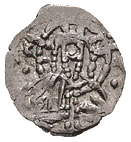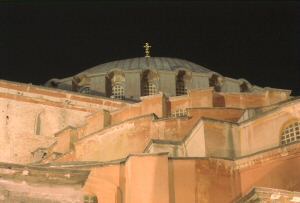Constantinoupolis
on the web
Books - Selected by
Elpenor

Constantinople does not win so much with multitudes and
arms, as with her virtue and word
Manuel II Palaeologus
 Arnold Toynbee, The
Greeks and their Heritages Arnold Toynbee, The
Greeks and their Heritages
 Baynes-Moss (eds),
Byzantium, An Introduction to East Roman Civilization Baynes-Moss (eds),
Byzantium, An Introduction to East Roman Civilization
 John Julius Norwich, A Short History of Byzantium
John Julius Norwich, A Short History of Byzantium
 TTC Audiobooks - World of Byzantium, Lectures by Kenneth W.
Harl
TTC Audiobooks - World of Byzantium, Lectures by Kenneth W.
Harl
 Charles Diehl, Histoire de l’Empire Byzantin
Charles Diehl, Histoire de l’Empire Byzantin
 Steven Runciman, La Caida de Constantinopla
Steven Runciman, La Caida de Constantinopla
 Donald Nicol, The
Immortal Emperor: The Life and Legend of Constantine Palaiologos, Last
Emperor of the Romans Donald Nicol, The
Immortal Emperor: The Life and Legend of Constantine Palaiologos, Last
Emperor of the Romans
 Chris Woodhouse, Modern
Greece. A short history [from the foundation of
Constantinople until 1990] Chris Woodhouse, Modern
Greece. A short history [from the foundation of
Constantinople until 1990]
 C. A. Trypanis. Medieval and Modern Greek Poetry:
An Anthology C. A. Trypanis. Medieval and Modern Greek Poetry:
An Anthology
 Robert Browning, Medieval and Modern Greek Robert Browning, Medieval and Modern Greek
Cf.
eMule downloads of
primary and secondary sources on Byzantium |
Migne Patrologia Graeca
|

Constantinople Home Page
By abandoning old Rome and moving to the
Greek East, Constantine indicated that the future of the Empire lay in the East.
The Byzantine Greeks almost ignored the developments in the Western Church,
where the bishop of Rome was the sole patriarch. True, the Eastern Church
acknowledged and honored the bishop of the old capital as the first among equals
(primus inter pares) in honor, but she did not consider him Pontifex Maximus
(chief bishop) or vicar of Christ on earth. ...
After several confrontations between the Eastern and Western, or
Greek and Latin, churches, there came a crisis in the year 1054, which is the
traditional date of the great schism. The major problem in the dispute was the
Roman claim to primacy in arbitrating all matters of faith, morals, and
administration. The Greek East, which knew of no precedent for this claim, had
refused to accept it. ...
The two worlds were further divided as a result of the barbarism of
the Crusades and the brutalities they inflicted upon the Greek East. The
Crusaders’ "macabre expression of a pagan death-wish," in the words of a modern
Western historian, brought the final rupture between Roman Catholicism and Greek
Orthodoxy. ...
From: Constantelos,
Greek Orthodoxy - From Apostolic Times to the Present Day
|